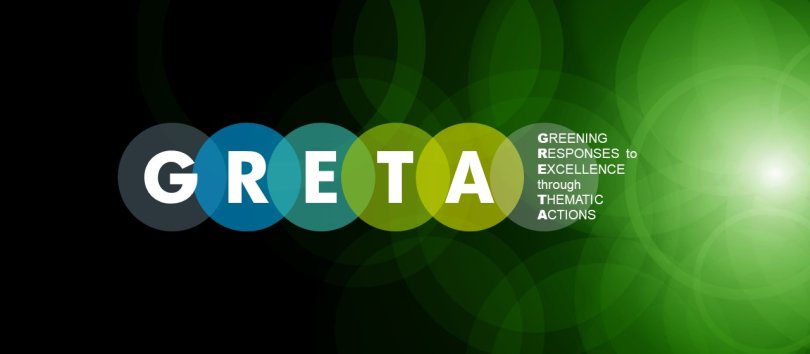
Looking into the green and digital future
On 26 April, the European Training Foundation (ETF) went online with its innovative GRETA initiative aimed at supporting the role of vocational education and training (VET) in the green and digital transition. Named after the Swedish activist, Greta Thunberg, the GRETA webinar (Greening Responses to Excellence through Thematic Actions) had more than 100 participants from nearly 40 countries visiting the research laboratories at the Danish Technological Institute (DTI).
There were live presentations of emerging green technologies from the DTI’s Concrete Centre, which is involved in researching and developing 3D printed buildings, and the Indoor Climate Laboratory at the Energy Efficiency and Ventilation Centre.
David Tveit, Executive Vice President Energy & Climate at DTI, emphasized the need for new skill sets towards electrification, renewable energy and energy efficiency. Such an approach was apparent in the virtual tour, which explained how ventilation systems are tested and can be improved, and how 3D printing uses less concrete in construction.
'We’ve 40 people working on concrete in three main areas – climate adaptation, digitalisation and sustainability. 3D concrete printing is rather new technology, with lots of development still going on,' said Thomas Juul Andersen, Architect and Team Manager at DTI.
The twin transition and social dialogue
The virtual tour was part of a livestream event, “The ETF Network for Excellence - GRETA: Greening Responses to Excellence through Thematic Actions - Looking into the Green and Digital future”.
Global production is currently undergoing two simultaneous and interlinked transitions - the green transition and the digital transition. As part of its efforts to achieve the transition, the ETF has pioneered its GRETA initiative to incubate, nurture and share green skills.
'The green transition focuses on reducing carbon emissions, improving energy efficiency, and promoting renewable energy sources, while the digital transition involves the integration of digital technologies in society. The green and digital transitions can complement each other but can also clash on certain aspects. Only if managed well, can digital technologies support the green transition,' said Susanne Nielsen, ETF’s Green Skills Expert and Country Liaison Officer for Ukraine.
'Social dialogue is essential for creating a sustainable and fair transition to a green economy. In the context of green skills, social dialogue plays a crucial role in ensuring that policies and training programmes developed to promote environmental sustainability are relevant and effective,' Nielsen explained.
The GRETA initiative
The ETF – an EU agency supporting neighbouring countries to reform their education and training systems in the context of the EU’s external relations policies – acts as an important facilitator for partnerships, peer learning and practice sharing in vocational excellence. To tap into the knowledge accumulated worldwide, the ETF Network for Excellence (ENE) is a global network of centres of vocational excellence (CoVEs). GRETA supports the greening of VET and is implemented in the framework of ENE.
'Irrespective of their different structural parameters, CoVEs have a shared sense of urgency in responding to the green and digital transitions, and a mutual interest in learning from sustainable practices,' said Nielsen.
GRETA connects 14 CoVEs in ETF partner countries – Armenia, Georgia, Serbia, Turkey and Ukraine – and four centres in Slovenia, Latvia and Spain.
'GRETA supports in consolidating the knowledge gained from peer learning activities, which includes comprehensive peer visits and reviews, learning sessions and the exchanges of greening of VET,' Nielsen explained.
Future disruptions
Kathrine Jensen, Policy Analyst at the European Commission’s Joint Research Centre (JRC), talked about the role of its policy lab in forecasting future challenges and disruptions.
'Technology is only a small part of the equation. Contextual factors can determine success – society, economy, and politics. The key skills for today and the future is collaboration - between stakeholders, across sectors and involving public-private partnerships (PPPs). Digital skills and digital literacy are needed for the green transition,' said Jensen. 'The only constant is change.'
Triple transition
Anja Trier Wang, Leading senior advisor at the Confederation of Danish Industry (CDI), talked of a triple transition – digital, green, and TVET. While these were universal challenges, she highlighted skills shortages and the need for more apprenticeships to meet the looming skills shortage. Exchanging with CoVEs the success of apprenticeships, the role of social dialogue was emphasised as the key factor in ensuring a fair playing field for employees and employers alike.
VET Toolbox
Bart Horemans, Team Leader at VET Toolbox, presented this programme co-implemented by the British Council, Enabel, Expertise France, GIZ and LuxDev. VET Toolbox aims to improve the effectiveness of VET systems by making them more opportunity-driven, turning investments into drivers for inclusive economic growth, social development, and decent job creation.
Anna Lazor, VET Toolbox Liaison Officer for GIZ, presented the latest knowledge products developed in the framework of the VET Toolbox programme. These resources are focused on "Skills for the Green Transformation" and showcase good practice examples of approaches, tools, processes, and initiatives that contribute to developing the skills needed to work towards the green transformation.
What’s next?
The green transition is a core part of the EU’s Green Deal Industrial Plan for the Net Zero Age, adopted in February, said Tim Van Rie, Policy Officer Digital and Green Skills, DG Employment, Social affairs and Inclusion at the European Commission.
'The green transition must be people-centred and will need to build on [other programmes such as the] Skills Agenda, European Education Area, Pact for Skills and the European Year of Skills 2023,' he said.
Upcoming events that will build on the topics discussed in the webinar include the Forum on Vocational Excellence 2023, in September in Amsterdam, and an ENE conference in Torino later in the year.
Click here for more information about GRETA.
Did you like this article? If you would like to be notified when new content like this is published, subscribe to receive our email alerts.